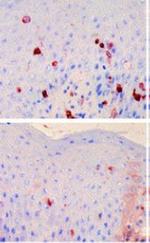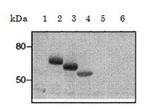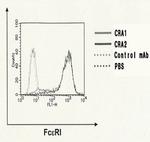FIGURE: 1 / 3
FceR1 alpha Antibody (MA1-4998) in IHC (F)



Product Details
MA1-4998
Species Reactivity
Host/Isotype
Class
Type
Clone
Immunogen
Conjugate
Form
Concentration
Purification
Storage buffer
Contains
Storage conditions
Shipping conditions
RRID
Product Specific Information
MA1-4998 detects Fc epsilonR1 alpha from human samples. The CRA2 (AER24) monoclonal antibody reacts with the Fc epsilonR1 alpha subunit on a region that overlaps the region of the IgE binding site, thus it competes with IgE for the receptor binding. Since
MA1-4998 has been successfully used in Western blot, flow cytometry, and immunohistochemistry applications.
The MA1-4998 immunogen is region of Fc epsilonR1 alpha which overlaps with the IgE binding site.
The epitope has been mapped to amino acids 110-197.
Target Information
FceR1 (Fc epsilonR1 alpha) is a subunit of the high affinity receptor of IgE. Fc epsilonR1 alpha is a tetrameric complex consisting of one alpha, one ß and two additional subunits. The latter two are required for signal transduction activity. The Fc epsilonR1 complex plays an important role in triggering allergic responses, and the immunoglobulin epsilon receptor (IgE receptor) is the initiator of the allergic response. When two or more high-affinity IgE receptors are brought together by allergen-bound IgE molecules, mediators such as histamine, which are responsible for allergy symptoms, are released. The IgE receptor couples allergen and mast cells to initiate the inflammatory responses that are characteristic of disorders such as hay fever and asthma. The release of histamine and proteases leads to the synthesis of prostaglandins and leukotrienes-potent effectors of the hypersensitivity response.
For Research Use Only. Not for use in diagnostic procedures. Not for resale without express authorization.
References (0)
Bioinformatics
Protein Aliases: fc epsilon r1; Fc epsilon receptor Ia; Fc epsilon RI alpha-chain; Fc fragment of IgE, high affinity I, receptor for; alpha polypeptide; Fc IgE receptor, alpha polypeptide; Fc-epsilon RI-alpha; FcERI; high affinity immunoglobulin epsilon receptor alpha-subunit; High affinity immunoglobulin epsilon receptor subunit alpha; IgE Fc receptor subunit alpha; immunoglobulin E receptor, high-affinity, of mast cells, alpha polypeptide; RP11-550P17.3
Gene Aliases: FCE1A; FCER1A; FcERI
UniProt ID: (Human) P12319
Entrez Gene ID: (Human) 2205

Performance Guarantee
If an Invitrogen™ antibody doesn't perform as described on our website or datasheet,we'll replace the product at no cost to you, or provide you with a credit for a future purchase.*
Learn more
We're here to help
Get expert recommendations for common problems or connect directly with an on staff expert for technical assistance related to applications, equipment and general product use.
Contact tech support
